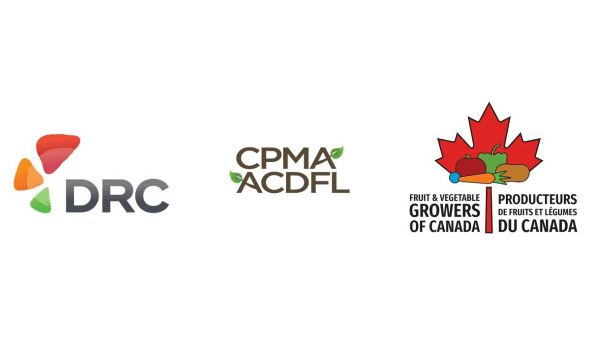June 8, 2022 (Ottawa, ON) – The members of the Fresh Produce Alliance [comprised of the Canadian Produce Marketing Association (CPMA) BB #:153602, the Fruit and Vegetable Dispute Resolution Corporation (DRC) BB #:163706, and Fruit and Vegetable Growers of Canada (FVGC)] enthusiastically welcomed today’s introduction of Bill C-280, the Financial Protection for Fresh Fruit and Vegetable Farmers Act, by Conservative Member of Parliament Scot Davidson (York–Simcoe).
If passed, Bill C-280 would establish a deemed trust mechanism for fresh produce growers and sellers in Canada, ensuring payment in the case of a buyer bankruptcy. The need for a financial protection mechanism has been a major focus of the sector’s federal advocacy efforts for several years and has been included among recommendations made by the House of Commons Standing Committees on Finance and Agriculture and Agri-food.
“Growing, harvesting, packing, and marketing fruits and vegetables comes with risks and costs that are unique to the production of perishable goods – and returns on these investments are delayed until payment is collected, usually long after the product has been passed on or consumed by Canadians,” said FVGC Executive Director Rebecca Lee.
“Having lived the challenge of a client’s bankruptcy and ensuing losses, I believe that Bill C-280 establishes a critical tool to ensure that growers receive payment for their products, even in the event of a buyer bankruptcy,” said Quinton Woods, Chair of FVGC’s Trade and Marketing Working Group, and a grower–packer–shipper from Bradford, Ontario in MP Davidson’s riding.
“In addition to providing healthy food to Canadians, the fresh produce supply chain supports 249,000 jobs in Canada. A deemed trust mechanism is necessary to address gaps in market stability, trade and food security, with no cost to the government,” said CPMA President Ron Lemaire. “We call on all political parties to support Bill C-280 to help ensure that Canadians continue to have access to fresh fruits and vegetables.”
The introduction of a financial protection mechanism in Canada would also open the door to the reinstatement of preferential treatment under the U.S. Perishable Agricultural Commodities Act (PACA) for Canadians selling produce into the United States. This preferential treatment had been in place prior to 2014, when it was rescinded by the U.S. due to a lack of reciprocal protection in Canada.
“Without preferential access, Canadian sellers are now required to post a bond worth double the value of the shipment just to initiate a formal claim through PACA, putting Canadian businesses at a steep disadvantage,” said DRC President and CEO Luc Mougeot, “Bill C-280 paves the way for a reciprocal arrangement that would support Canadian businesses selling to our largest trading partner.”
For more information, please contact:
Micken Kokonya
Manager, Communications and Market Research
Canadian Produce Marketing Association
Telephone: 613-226-4187 x225 | Cell: 613-878-3312
Email: mkokonya@cpma.ca
Robyn McKee
Manager, Policy Research and Development
Fruit and Vegetable Growers of Canada
Telephone: 613-297-6512
Email: rmckee@fvgc.ca
Luc Mougeot
President and CEO
Fruit and Vegetable Dispute Resolution Corporation (DRC)
Email: LMougeot@fvdrc.com
About the Canadian Produce Marketing Association (CPMA):
Based in Ottawa, Ontario, CPMA is a not-for-profit organization that represents a diverse membership made up of every segment of the produce industry supply chain who are responsible for 90% of the fresh fruit and vegetable sales in Canada. CPMA is fortunate to represent a sector that is both a significant economic driver for communities and that also improves the health and productivity of Canadians.
About Fruit and Vegetable Growers of Canada (FVGC):
Fruit and Vegetable Growers of Canada (formerly the Canadian Horticultural Council) is an Ottawa-based voluntary, not-for-profit, national association that represents fruit and vegetable growers across Canada involved in the production of over 120 different types of crops on over 14,237 farms, with farm cash receipts of $5.7 billion in 2020. Since 1922, FVGC has advocated on important issues that impact Canada’s horticultural sector, promoting healthy, safe and sustainable food, and ensuring the continued success and growth of our industry.
About the Fruit and Vegetable Dispute Resolution Corporation (DRC):
The Fruit and Vegetable Dispute Resolution Corporation (DRC) is a non-profit, membership-based organization serving the produce trade. DRC provides harmonized standards, procedures and services to help members avoid commercial disputes, as well as consultation, mediation and arbitration services when disputes arise. The DRC can help with disputes that arise between members domestically or internationally and deals with all types of disputes, including condition, contract and payment issues. We work closely with industry associations and governments on behalf of our members to reform legislation, make federal inspections more accessible, develop best practices, and level the playing field for participants.



